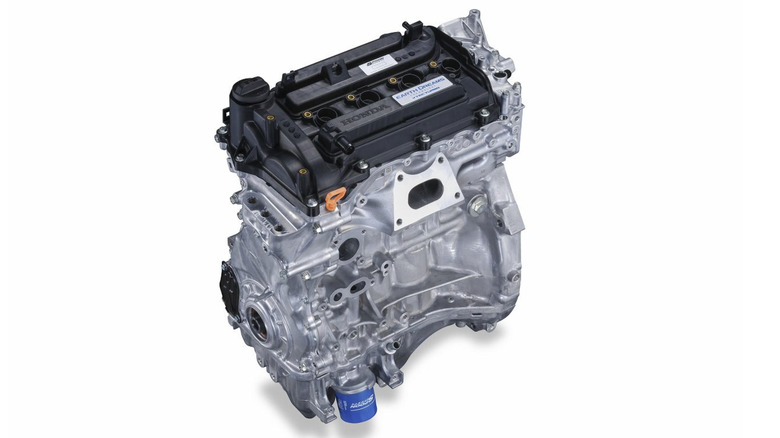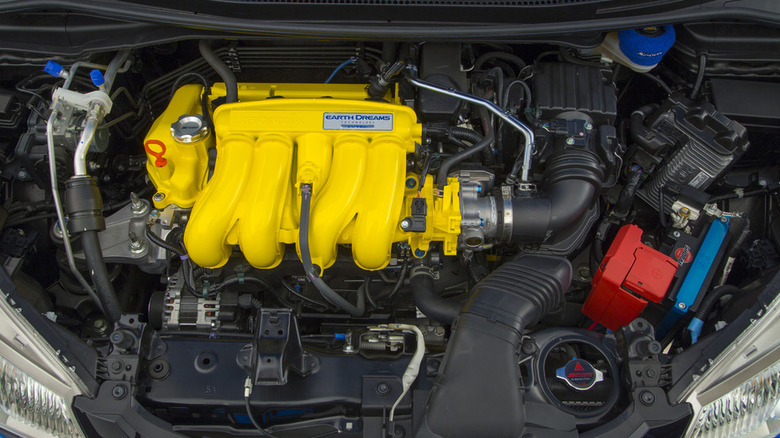What Exactly Are Spoon Engines And Are They Any Good?
If you've ever been a car-movie-obsessed teen, you probably know the line "Hector is gonna be running three Honda Civics with Spoon engines." Those who haven't seen "The Fast and The Furious," however, are less likely to know that reference. Delivered by Paul Walker as his character Brian O'Connor in 2001's The Fast and the Furious, that line refers to a trio of Hondas being built for an upcoming street-racing competition in the movie. The implication is that the Spoon engines are a secret weapon and a modification to be feared. The intel that the rivals are installing these engines in their race cars was a big bombshell.
As it turns out, despite the Fast and Furious franchise's affinity for exaggeration and wild car stunts, this was actually a legit reference. When I originally saw the movie back in theaters, I knew exactly what Walker was referring to — a friend of mine had Spoon parts installed on his Honda S2000 and he was the envy of every local car meet. Like most Japanese automotive enthusiasts, I knew about Spoon back in the early 2000's, especially since the company had been around since 1988, racing in its iconic blue and yellow livery. The parts were pricey, but the name commanded respect since Spoon had built many cars for various race series over the years, including endurance challenges like the 24 Hours of the Nürburgring.
What does Spoon Sports do to modify engines?
Spoon (technically called Spoon Sports) doesn't manufacture engines on its own, but that doesn't mean you can't buy a complete engine directly from Spoon. Technically, the folks at Spoon modify Honda and Acura products, tuning them in a way that improves performance but maintains a "distinctive 'Honda engine feel.'" Spoon adjusts various engine components like valve spring rates, piston ring tension, and the weight balance of moving parts, all with the goal of maintaining engine reliability.
Spoon's full engines start off as new OEM engines, sourced from Honda, then torn down and rebuilt in the Spoon facility, using Spoon parts and build techniques to complete the build. The Honda K20C engine is one specific example of an engine that Honda builds (and uses in high-performance models like the Civic Type R) and then Spoon goes to work on it. A complete Honda K20C engine can be purchased directly from Spoon with a unique head gasket and specially-balanced pistons. Spoon touts precise weight management and the decrease of engine vibrations as the benefits of their in-house builds, admitting that there's no effect on power. The lack of added power is a hard pill to swallow when you consider the Spoon K20C's as-new cost of $13,000. Untuned K20C engines often cost much less, but Spoon engine buyers are getting an entirely new unit and what Spoon calls a smooth-revving engine with better driving feel.
Besides engines, does Spoon Sports offer any other products?
Currently, Spoon offers all sorts of aftermarket parts to enhance your build. All the cars on its roster are Honda or Acura vehicles with upgrades available for the Accord, Civic, CR-Z, Fit, Integra, NSX and S2000. Parts are available for vehicles dating back as far as 1989 and as modern as 2024 Civic Type R. All sorts of performance parts can be purchased from Spoon, like limited slip differentials, engine and transmission mounts, unique carbon-fiber spoilers, and specialized exhaust systems.
It's more than just the high-level stuff though, as Spoon offers a number of products for serious racers. Spoon's rigid collar kit, for example, fills a small 2mm gap in a vehicle's subframe bolt holes. It might not be the first modification you think of when you start wrenching on your own car, but it's certainly worth considering if you spend a lot of time on the racetrack. Want some aerodynamic mirrors for your race car? Spoon has those too, a pair of which were used to build the epic Evasive Motorsports S2000R restomod. Spoon's tuning method is what it calls "building up of small elements" where the focus is on small, comprehensive change. Tiny increases across all performance metrics, by their calculations, lead to better lap times at the track and a more balanced car – a solid strategy from a company that still commands quite a bit of respect in the tuner world and on the track.


